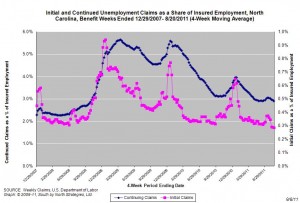08.09.2011
Policy Points
Economic policy reports, blog postings, and media stories of interest:
08.09.2011
Policy Points
For the benefit week ending on August 20, 2011, 9,481 North Carolinians filed initial claims for state unemployment insurance benefits, and 105,076 individuals applied for state-funded continuing benefits. Compared to the prior week, there were fewer initial and fewer continuing claims. These figures come from data released by the U.S. Department of Labor.
Averaging new and continuing claims over a four-week period — a process that helps adjust for seasonal fluctuations and better illustrates trends — shows that an average of 10,654 initial claims were filed over the previous four weeks, along with an average of 108,206 continuing claims. Compared to the previous four-week period, the averages of initial and continuing claims were lower.
One year ago, the four-week average for initial claims stood at 12,690 and the four-week average of continuing claims equaled 130,629.
While the number of claims has dropped over the past year so has covered employment. Last week, covered employment totaled 3.7 million, down from 3.8 million a year ago.
 The graph shows the changes in unemployment insurance claims (as a share of covered employment) in North Carolina since the recession’s start in December 2007.
The graph shows the changes in unemployment insurance claims (as a share of covered employment) in North Carolina since the recession’s start in December 2007.
Both new and continuing claims appear to have peaked for this cycle, and the four-week averages of new and continuing claims have fallen considerably. Yet continuing claims remain at an elevated level, which suggests that unemployed individuals are finding it difficult to find new positions.
08.09.2011
Policy Points
A recent story by McClatchy Newspapers reported on how the fundamental economic problems facing American small businesses is not “uncertainty” about governmental policies and taxes, but rather other factors like poor sales.
McClatchy reached out to owners of small businesses, many of them mom-and-pop operations, to find out whether they indeed were being choked by regulation, whether uncertainty over taxes affected their hiring plans and whether the health care overhaul was helping or hurting their business.
…
Their response was surprising.
…
None of the business owners complained about regulation in their particular industries, and most seemed to welcome it. Some pointed to the lack of regulation in mortgage lending as a principal cause of the financial crisis that brought about the Great Recession of 2007-09 and its grim aftermath.
07.09.2011
Policy Points
Economic policy reports, blog postings, and media stories of interest:
07.09.2011
Policy Points
Last week, Morning Edition, a program of National Public Radio, reported on “Georgia Works,” a controversial program for unemployed workers developed by the State of Georgia. The story explains how the program works and how its results appear mixed at best.
Click here to listen to the report.


 Email Sign-Up
Email Sign-Up RSS Feed
RSS Feed